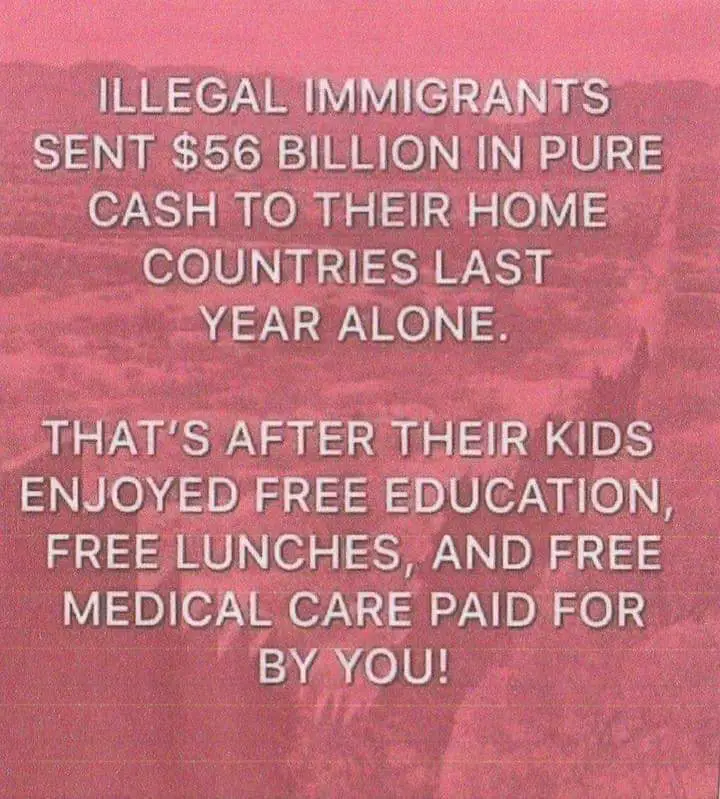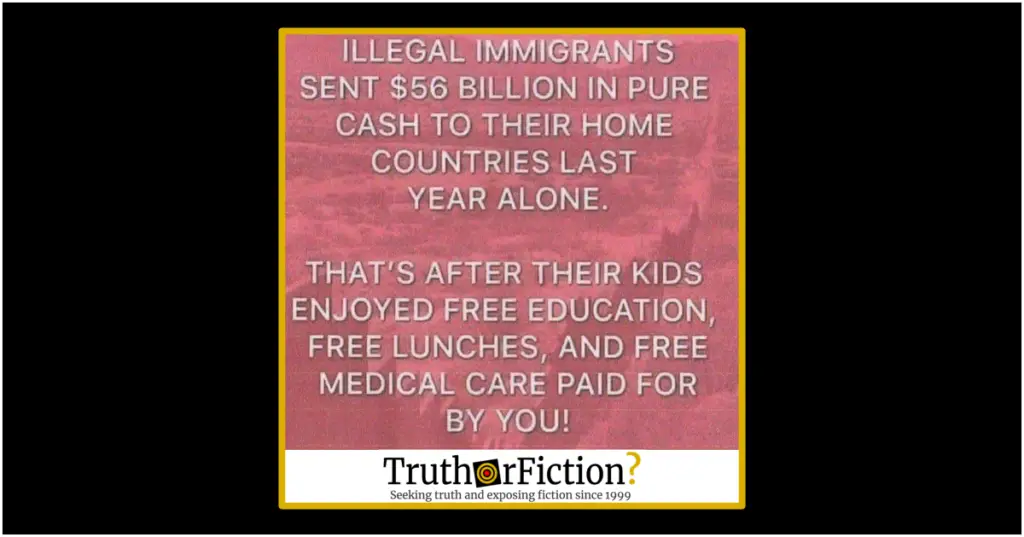Against the backdrop of a long-running federal shutdown, purportedly over border wall funding, a Facebook user shared the following meme in January 2019:

It read:
ILLEGAL IMMIGRANTS SENT $56 BILLION IN PURE CASH TO THEIR HOME COUNTRIES LAST YEAR ALONE.
THAT’S AFTER THEIR KIDS ENJOYED FREE EDUCATION, FREE LUNCHES, AND FREE MEDICAL CARE PAID FOR BY YOU!
No citations accompanied these claims, which are twofold — one, that undocumented immigrants sent $56 billion to their countries of origin in 2018, and two, that the children of those immigrants were enrolled in school — receiving a free education, free lunches, and free medical care fully funded by American taxpayers.
In regard to the meme’s secondary claims, “undocumented children and young adults have the same right to attend public primary and secondary schools as do U.S. citizens and permanent residents.”
Undocumented immigrants do pay taxes in a number of ways; for example, few in the United States are exempt from sales tax, and roughly half of all undocumented people filed tax returns despite not having a social security number. In April 2018, Vox explained how the undocumented pay taxes at various state and federal levels:
I watched tax preparer Earvin Gonzalez go through the process of helping undocumented immigrants file their taxes. Maria, whose last name is being withheld because of her immigration status, handed him a folder with tax documents from two jobs. Her W-2 showed that a housecleaning company paid her $17,288 in 2015.
As Gonzalez filled out her information in a computer software program, a green box popped up on the computer screen: “Taxpayer’s Social Security number is not valid.”
That wasn’t a surprise … Instead [of a social security number], she has an Individual Taxpayer Identification Number (ITIN), created by the IRS in 1996 so people who aren’t allowed to work in the United States could still file taxes on any income they earned. (The IRS does not share ITIN information with immigration authorities.)
Maria said she applied for an ITIN number shortly after arriving illegally in the United States from El Salvador in 2009. People told her that having a record of paying taxes would help her with her case to gain legal status if immigration reform happened … It’s true that not all undocumented immigrants pay federal income taxes, because the government has no way to keep track of their under-the-table earnings. The IRS can withhold taxes from those hired with fake Social Security numbers, but workers who get paid in cash could simply choose not to report it, unless they voluntarily file a return with an ITIN number.
Still, all undocumented workers fund public schools and local government services by paying sales and property taxes like everyone else. The Institute on Taxation and Economic Policy estimates that they pay about $11.7 billion a year in state and local taxes.
The meme heavily implies that United States citizens carry the sole burden of funding education and school lunch programs, but that is not the case. Undocumented immigrants do get taxed and often file their own tax returns with the Internal Revenue Service (IRS).
With respect to “free healthcare,” it is not true that undocumented immigrants have access to programs providing it:
Undocumented immigrants are not eligible to enroll in Medicaid or CHIP or to purchase coverage through the ACA Marketplaces. However, Medicaid payments for emergency services may be made on behalf of individuals who are otherwise eligible for Medicaid but for their immigration status. These payments cover costs for emergency care for lawfully present immigrants who remain ineligible for Medicaid as well as undocumented immigrants. Since 2002, states have had the option to provide prenatal care to women regardless of immigration status by extending CHIP coverage to the unborn child. In addition, some states have state-funded health programs that provide coverage to some groups of immigrants regardless of immigration status. There are also some locally-funded programs that provide coverage or assistance without regard to immigration status
In a broad sense, the second portion of the meme suggested that undocumented immigrants somehow enjoy unfettered access to the United States’ safety net, a sentiment that is not supported by fact.
The meme’s primary claim, though, is that undocumented immigrants sent “$56 billion in pure cash to their home countries last year [2018] alone.” That number seemed to stem from a Wikipedia page, “Remittances from the United States.” Its first paragraph contained an important distinction, though:
International money transfers made by migrant workers and immigrants sending a portion of their earnings to their families in their country of origin are known as remittances. Remittances are an important aspect of the global economy, totaling an estimated $601 billion (USD) for the year 2015. The United States is currently the largest source of international remittances in the world, sending a total of $56.3 billion in 2015. Mexico received the largest portion of these remittances, accounting for an estimated $25.2 billion, making the U.S.-Mexico remittance corridor one of the largest in the world.
The figure of $56 billion matched the meme’s claims, but that number was attributed to monies sent by all “migrant workers and immigrants” in 2015. The year was incorrect, but the larger inaccuracy by far is the assumption that all immigrants and migrant workers are undocumented.
In June 2018, the Washington Post examined the American public’s misconception about the number of undocumented immigrants as it relates to the number of all immigrants living in the US:
There are about 11 million immigrants in the United States who came here illegally … In total, nearly 45 million residents of the United States were foreign-born. In other words, about three-quarters of immigrants in the country are here legally.
Most Americans, though, don’t know that. Pew asked respondents whether most immigrants in the United States were here legally or illegally. Only 45 percent said, correctly, that most are here legally. A slightly lower percentage, 42 percent, said illegally.
That reporting didn’t delve into the topic of remittances, but the proportion of immigrants to undocumented immigrants was a vital aspect of its piece (which was based on Pew research). There were 45 million immigrants in the United States at the time of its reporting in June 2018, and only 11 million are estimated to be in the United States without proper documentation.
In July 2017, the United Nations International Fund for Agricultural Development released a report on the global impact of remittances, noting that they totaled 15 percent of immigrants earnings:
While [the sum of global remittances] might seem like a lot of money, migrant workers around the world earn about $3 trillion a year and only about 15 percent of their earnings are sent back home. Altogether about 200 million immigrants — equally divided among men and women — around the globe send money to their families. About 800 million people around the world are directly supported by remittances.
[…]
The majority of the money sent to home countries is usually spent right away, the report said. About 75 percent of remittances are used to cover basic needs such as food, shelter and recurring bills. Another 10 percent of remittances are used for things like education and health, while the remaining 15 percent is used for savings and investing in businesses or real estates.
The meme’s two-pronged claim is thus false on both counts. The year in which remittances from the United States totaled $56 million was 2015, not 2018. And those funds were sent by all immigrants — the majority of immigrants in the United States are documented.
Further, undocumented workers very often pay taxes on income and other things, so enrollment of their children in schools is not any more “free” than it is for fully-fledged citizens. Finally, undocumented workers and children are not entitled to free medical services.
- Immigrant Students' Rights to Attend Public Schools
- Undocumented immigrants pay billions of dollars in federal taxes each year
- Undocumented youth in the United States
- Health Coverage of Immigrants
- Do Undocumented Immigrants Overuse Government Benefits?
- Most immigrants are in the U.S. legally, something most Americans don’t know
- Immigrants around the world sent $445 billion back to their home countries last year
- 5 facts about illegal immigration in the U.S.

